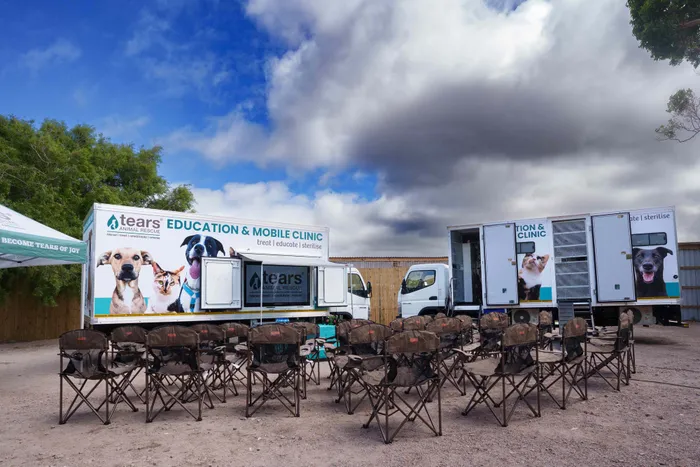Tears launches mobile clinics to help animals

The two new prototype Tears education and treatment mobile units were “unveiled” at a media launch at Tears Animal Rescue on Wednesday December 11.
Tears Animal Rescue has launched two new mobile clinics designed to expand its reach across the Western Cape.
The Dov, Edie, and Cicely Blumberg Project provided over R3 million to outfit the trucks with treatment and education facilities to improve animal welfare in poor communities, says Tears.
Tears co-founder and director Marilyn Hoole paid tribute to her late friend, Cicely Blumberg, whose vision for humane education, she said, continued to inspire the project.
“While Cicely is no longer here to witness her mission realised, this project ensures her legacy of kindness and care lives on in the communities we serve,” Ms Hoole said.
The clinics have 26 cages and equipment for microchipping, vaccinations, and basic medical treatment.
They are also designed as “classrooms on wheels” with a 75-inch LED TV, audio-visual equipment, a whiteboard, and space for 20 foldable chairs.
The mobile units can provide on-site services and transport animals needing specialised care to Tears veterinary hospital.
"They will help us expand our capacity to provide care and education, not only to our mandated communities but also in collaboration with other non-profits working in at-risk areas," said Tears operations manager Mandy Store.
Each mobile unit has separate sections for cats and dogs.
The cat section has 11 cages, a fold-up examination table, work surfaces, a basin, and a fridge, while the dog section has four large and eight medium-sized cages, an examination table, and work surfaces.
Both sections have retractable ramps, stainless steel security doors, overhead lighting, air-conditioning, a water tank, and a grey-water tank. The clinics also have an inverter and generator.
At the launch of the clinics, on Wednesday December 11 at Tears Animal Rescue, mayoral committee member for safety and security JP Smith emphasised the importance of humane education in breaking the cycle of violence.
“If young people grow up seeing cruelty, whether to people or animals, it normalises unkindness and predisposes them to violence,” Mr Smith said.
Mr Smith said companion animals had legally enforceable rights to food, water, and shelter - rights the new clinics aimed to reinforce.
Tears veterinarian Dr Tracy Dicks said the mobile clinics would bring much-needed care to communities with limited access to veterinary services.
“Many animals in these areas have never been in a car before, so bringing them to a clinic can be overwhelming. Treating them on-site reduces stress for both animals and owners,” Dr Dicks said.
The clinics would help to prevent the spread of disease by keeping animals from gathering in one place.
“Equipped with microscopes, the clinics enable the team to show pet owners exactly what is wrong with their pets, sparking interest in community education about proper pet care,” she said. “We’re so grateful to everyone who made this possible.”

